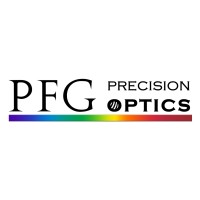
PFG Precision Optics, Inc.
PFG Precision Optics is a leading manufacturer of high-end optical components, assemblies, and thin-film coatings. Since 1977, PFG has maintained an industry-leading reputation for high-quality optics and outstanding customer service. We are valuable and reliable partners with our customers who are active in the defense, semiconductor, test and measurement, laser, and a variety of other commercial markets. PFG fabricates tight tolerance spherical optics and flat optics with stringent specifications and complex shapes. Complementing our fabrication capabilities, we provide in-house E-beam and ion-assist coating services in the deep UV through mid-IR segments of the spectrum. PFG is also ISO 9001:2015 certified and ITAR registered. We encourage you to visit our website, www.pfgoptics.com, or call us at (228) 875-0165 to better understand why so many companies come to us for their precision optical requirements.






